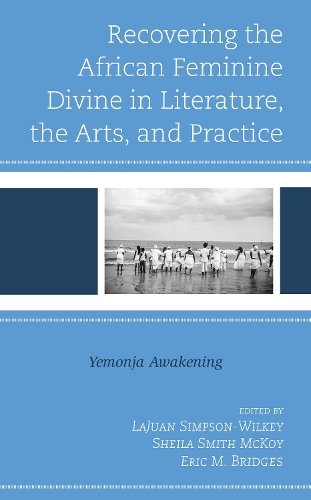
Recovering the African Feminine Divine in Literature, the Arts, and Practice: Yemonja Awakening
(Paperback)
Publishing Details
Recovering the African Feminine Divine in Literature, the Arts, and Practice: Yemonja Awakening
By (Author) LaJuan Simpson-Wilkey
Edited by Sheila Smith McKoy
Edited by Eric M. Bridges
Contributions by LaJuan Simpson-Wilkey
Contributions by Eric M. Bridges
Contributions by Tarell Kyles
Contributions by Iya Osundamisi Fafunke
Contributions by Sandra Gonsalves-Domond
Contributions by Grace Sintim Adasi
Contributions by Sheila Smith McKoy
Bloomsbury Publishing PLC
Lexington Books
10th May 2022
United States
Classifications
Professional and Scholarly
Non Fiction
Literary studies: general
Cultural studies
299.68333
Physical Properties
Paperback
152
Width 154mm, Height 220mm, Spine 11mm
240g
Description
Recovering the African Feminine Divine in Literature, the Arts, and Performing Arts: Yemonja Awakening provides context to the myriad ways in which the African feminine divine is being reclaimed by scholars, practitioners and cultural scholars worldwide. This volume addresses the complex ways in which the reclamation of and recognition of Yemonja facilitates cultural survival and the formation of African -centric identity. These cultural practices are symbolically represented by Yemonja, the African female deity who is the mother of the entire world of the Orisha. Also known as Yemaya, Iemanya and Yemaya-Olokun, Yemonja is the deity whose province is the ocean and, given that the Middle Passage was the cultural and spatial crossroad to Africas numerous diasporas, this deity links the shared histories of African and African descent cultural praxis worldwide. Since Yemonja also references sexual, creative, spatial and spiritual energies, the editors and contributors see her as pivotal to this project as an expansive and original cartography of impact of the African feminine divine globally. This work provides the context for understanding how the spiritual conceptualizations of the African feminine divine underpin critical cultural forms, even when it has been previously unacknowledged and despite the cultural encounters with European and Western models of being. Scholars of African diaspora studies and the arts will find this book particularly interesting.
Reviews
A refreshingly timely collection of essays that immediately reminds readers of the elastic resilience of the African spiritual heritage that sustained and continues to nourish not only the African descendants, but also others in the Americas. The spiritual tradition of Yemoja (Yemanja, Iemanya), does not only demonstrate the survival and pertinence of African spiritual values to the benefit of countless numbers of people in their daily lives for purposes of restoration to wholeness, but it also finds expression in literature and the arts to enhance the quality of human life. Indeed, time and distance have not been able to shrink this mighty African feminine divine!
-- Kofi Asare Opoku, African University College of Communications, Accra, Ghana. Formerly Professor of Religious Studies, Lafayette College, Easton, PA. Author of West African Traditional Religion"This text is indeed a Yemonja Awakening! It is a much needed and unique contribution to decolonial thought in Africana Studies. Using a rich tapestry of experiences and knowledge in a stylistic mode that is readable, insightful and thoroughly engaging, it skillfully de-links from a colonial male-oriented gendering of African divinity. Re-linking to the endogenous and expansive female divine in Yemonja, the chapters in this text draw one into varied authentic and connected ways in which the resilience and power of the female river deity is manifested. A must read for all those concerned about decolonizing conceptions of African divinity."
-- Gerald M. Boodoo, Founding Director, Center for African Studies, Duquesne University"This book honors Yemonja, the preeminent goddess of arts, creativity, fertility, and productivity, the transcendent maternal figure who controls the sea, with magisterial power over the land. Yemonja herself gifted her expansive energies to the editors and contributors of this volume to see far and wide, brilliantly spiritualizing the essence of feminine divinity, effortlessly navigating the Atlantic world to rescue subdued voices and practices on femininity and godhood, covering considerable mileage in our understanding of Afro-Atlantic religion. Yemonja, I bow, I kneel, I prostrate. I do not call your name in vain!"
-- Toyin Falola, University of Texas at Austin, USAAuthor Bio
Dr. LaJuan Simpson-Wilkey is interim department chair for the department of social work and human services at Kennesaw State University.
Dr. Sheila Smith McKoy is provost and vice president for academic affairs at Holy Names University.
Eric Bridges is professor of psychology at Clayton State University.
